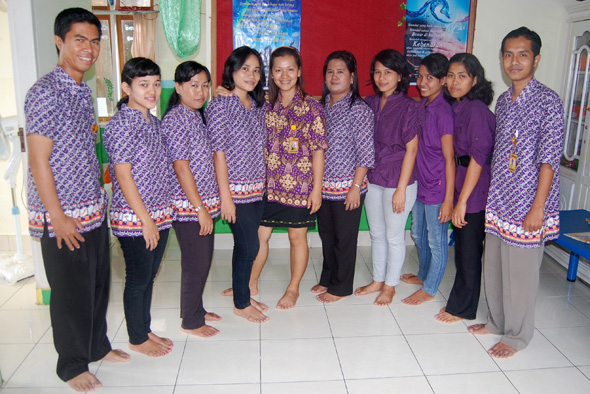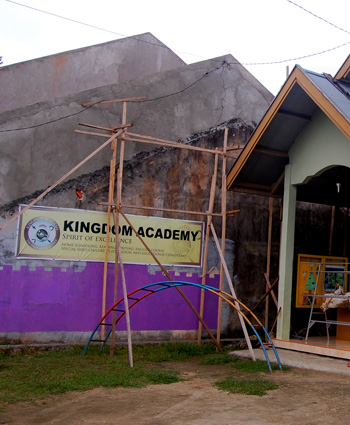Dirk Tomsa
The Kingdom Academy in KendariDirk Tomsa |
It’s 7.30 am in Kendari, the capital of Southeast Sulawesi. In the backstreets of this small town of just under 300,000 people, two boys aged two and six are getting ready for kindergarten and pre-school. It’s only a short walk to their classrooms once they have finished their breakfast and put on their uniforms. In fact, they don’t even have to leave the house. Both the kindergarten and pre-school are located inside their home and run by their mother, Mey Tanjung Niasari. Welcome to the Kingdom School. Kendari’s only school in a home.
Founded in 2009, the Kingdom School is a unique initiative in this part of Indonesia. It offers kindergarten and pre-schooling for children aged between two and six, but it is early learning with a difference. Children are allocated to groups and classes based not only on age, but also intellectual ability. The curriculum revolves primarily around character-building and increasing the children’s self-confidence. As a trained psychologist and motivational trainer, Mey is convinced that this approach facilitates early learning much better than conventional methods focused on memorising facts, words and numbers, which are still widely used in Indonesia. Defending her teaching philosophy, Mey criticises the lack of creativity, innovation and critical thinking in the country’s school system. ‘From Year 7 to Year 12, Indonesian children learn and memorise the date of the Linggarjati Agreement year in, year out. Six consecutive years, the same dates and names! What for?’
Building character, enhancing confidence
In the Kingdom School, the priority is on creating an enjoyable, productive and confident learning environment, not on forcing kids to memorise strings of dates. A popular activity at the beginning of the day is for the children to stand up in class, clap their hands and stomp their feet to the tune of Queen’s ‘We will rock you’. The original lyrics are replaced by the Indonesian words ‘Saya anak hebat!’ [I am a terrific child!].
Mey’s rather unconventional methods seem to work. According to Angel, a young mother whose five-year old daughter has attended the school for six months now, the Kingdom School has transformed her daughter from a shy and insecure child who never wanted to go to school into a confident and happy girl, eager to learn. ‘We’ve tried several different educational institutions before, but my daughter was always sad. She didn’t want to get out of bed in the morning. Nowadays she even wants to go to school on weekends,’ Angel says.
This emphasis on confidence and character building is particularly important for children with special needs and those who come from poor families. Mey’s school offers specific programs for dyslexic and autistic children, while monthly fees are negotiable in order to accommodate children from a variety of financial backgrounds. For children from particularly poor families the lessons are even free. To determine whether a family qualifies for this free education, Mey asks the parents to present a letter from the local subdistrict head that confirms the family’s financial circumstances. At the other end of the spectrum, more well-to-do families are charged fees of up to Rp. 600,000 per month. According to Angel, the fees are much higher than those charged by other schools in the area but she thinks that it’s worth every cent.
Humble beginnings
Setting up the school in the first place was not an easy process. As a Christian woman of mixed Chinese-Javanese background, Mey faced a number of prejudices and socio-cultural obstacles in the largely male-dominated Islamic society of Southeast Sulawesi. But she is not the kind of person who is easily intimidated by social conventions. Rather than circumvent potential problems, she prefers to tackle them head on.
When Mey first approached the head of the provincial education department with her idea to set up a pre-school in a private home, she encountered little more than raised eyebrows. For local bureaucrats in Kendari, the concept of home schooling was simply unheard of. ‘Not to worry’, thought Mey, who had done her homework. ‘I told the educational department head that while home schooling may not be specifically mentioned in the education laws, there is a section on “education outside school” (pendidikan di luar sekolah).’ She convinced the astounded bureaucrat that home schooling could be accommodated under that section and so the Kingdom School began to take shape.
Shortly after receiving the green light from the authorities, she set up a classroom with desks and chairs, bought books and recruited teachers. In selecting her teachers, Mey took care to employ committed people who had not only pedagogical skills but were also passionate about working with children. Moreover, as a devout Christian, Mey sought to employ teachers who shared her religious beliefs. Realising that local applicants who fulfilled this profile were few and far between, she soon cast the web wider. Eventually, teachers were recruited from all over Sulawesi, including Makassar, Toraja and Manado. Today the school has 12 staff members, who teach the children reading and writing as well as elementary maths, science, English and art.
Once the first staff had been recruited, the next step was to attract students. Or rather, to convince parents that this school was a worthy alternative to the established government and private schools in the area. For poor families, the provision of free lessons would later become a major draw card but Mey first needed some paying customers. Initially she prepared brochures that emphasised the school’s unique approach, but these had little apparent effect. Unwilling to give up, she decided to go door-to-door to promote her school. Since the first children were enrolled, she has relied on word-of-mouth promotion from satisfied parents.
The first class opened with just three children in August 2010. From these humble beginnings, the school has quickly grown to nearly 100 children today, though only a fraction of these actually comes on a daily basis. ‘Some children just come in for a few hours a week. Others come regularly one month, but then stay away for extended periods. It often depends on the financial circumstances of the child’s family,’ Mey explains. This kind of flexibility has certainly contributed to the school’s growing popularity. But many parents are attracted by the school’s approach to teaching rather than by anything else.
For example, Harni, a local pastor whose four-year old boy has attended the Kingdom School for more than a year now, is impressed with the school’s vision, its innovative curriculum and the skilful and passionate teachers. ‘Absolutely extraordinary for Kendari’, he says, ‘the children learn very quickly. And the results are excellent, especially in reading, writing and basic English language skills.’ He particularly likes the ‘communication book’ in which teachers and parents make notes about the children’s daily activities both in the school and at home so that they can work closely together in monitoring the children’s emotional and intellectual development.
 |
Mey Tanjung (fifth from the left) with some of her staffDirk Tomsa |
Future challenges
But despite its growing reputation, the school faces some serious challenges, which Mey and her staff will need to tackle if they want the Kingdom School to become a viable alternative to mainstream schools. Most of these challenges relate to funding. So far, Mey has effectively financed the project herself, partly by working as a trainer for teachers, partly by using money she received as winner of a writing competition. In September 2011, she received another financial boost when she beat more than 2000 other participants from all over Indonesia to win the so-called Women on Top award organised by the Japanese car manufacturer Mazda and an international fashion label called Mango. In the medium to long term, however, more regular sources of funding will be necessary to cover the growing costs of staff salaries, equipment and basic maintenance.
Mey is aware of these challenges, but she remains optimistic about the future of the school. In fact, she is determined to expand the project to other locations in Southeast Sulawesi. Plans are already under way to set up another Kingdom School in Raha, the capital of the Muna district. ‘People say I’m strange, but what I say is that God has endowed me with much greater spirit than most other people, so I keep imagining a lot of things that I can still achieve,’ Mey proclaims confidently. The children of Southeast Sulawesi are certain to appreciate her efforts.
Dirk Tomsa (d.tomsa@latrobe.edu.au) is a lecturer in Politics and Asian Studies at La Trobe University in Melbourne.
